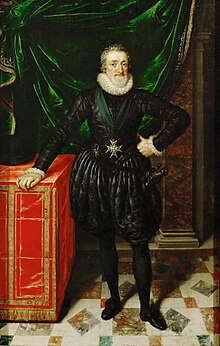Medieval French Coin Dauphine (Dolphin) France Silver Douzain Henri IV
Dauphine (Dolphin) France Silver Douzain Henri IV Rare Medieval French Coin.
Reign: King Henri IV
Date: Not Visible
Weight: 2.4 grams.
Note; slight bend in planchet.
TTI-553721
Some History according to Wikipedia:
Henry IV of France
| Henry IV | |||||
|---|---|---|---|---|---|

Portrait by Frans Pourbus the Younger, 1610
|
|||||
|
King of France
(more...)
|
|||||
| Reign | 2 August 1589 – 14 May 1610 | ||||
| Coronation | 27 February 1594 Chartres Cathedral |
||||
| Predecessor | Henry III | ||||
| Successor | Louis XIII | ||||
| King of Navarre | |||||
| Reign | 9 June 1572 – 14 May 1610 | ||||
| Predecessor | Jeanne III | ||||
| Successor | Louis II | ||||
|
|
|||||
| Born | 13 December 1553 Pau, Kingdom of Navarre |
||||
| Died | 14 May 1610 (aged 56) Paris, Kingdom of France |
||||
| Burial | 1 July 1610
Basilica of St Denis, Paris, France
|
||||
| Spouse |
|
||||
| Issue | |||||
|
|||||
| House | Bourbon | ||||
| Father | Antoine of Navarre | ||||
| Mother | Jeanne III of Navarre | ||||
| Religion | Protestantism 1553-1595 Roman Catholicism 1595-1610 | ||||
| Signature |  |
||||
|
Royal styles of King Henry IV Par la grâce de Dieu, Roi de France et de Navarre |
|
|---|---|
 |
|
| Reference style | His Most Christian Majesty |
| Spoken style | Your Most Christian Majesty |
| Alternative style | Sire |
Henry IV (French: Henri IV; 13 December 1553 – 14 May 1610), also known by the epithet Good King Henry or Henry the Great, was King of Navarre (as Henry III) from 1572 and King of France from 1589 to 1610. He was the first monarch of France from the House of Bourbon, a cadet branch of the Capetian dynasty. He was assassinated in 1610 by François Ravaillac, a fanatical Catholic, and was succeeded by his son Louis XIII.[1]
The son of Antoine de Bourbon, Duke of Vendôme and Jeanne d'Albret, the Queen of Navarre, Henry was baptized as a Catholic but raised in the Protestant faith by his mother. He inherited the throne of Navarre in 1572 on his mother's death. As a Huguenot, Henry was involved in the French Wars of Religion, barely escaping assassination in the St. Bartholomew's Day massacre. He later led Protestant forces against the royal army.[2]
He and his predecessor Henry III of France were direct descendants of Saint-King Louis IX. Henry III belonged to the House of Valois, descended from Philip III of France, elder son of Saint Louis; Henry IV belonged to the House of Bourbon, descended from Robert, Count of Clermont, younger son of Saint Louis. As Head of the House of Bourbon, Henry was "first prince of the blood". Upon the death of his brother-in-law and distant cousin Henry III in 1589, Henry was called to the French succession by the Salic law.
He initially kept the Protestant faith (the only French king to do so) and had to fight against the Catholic League, which denied that he could wear France's crown as a Protestant. After four years of stalemate, he converted to Catholicism to obtain mastery over his kingdom (reportedly saying, "Paris is well worth a mass."). As a pragmatic politician (in the parlance of the time, a politique), he displayed an unusual religious tolerance for the era. Notably, he promulgated the Edict of Nantes (1598), which guaranteed religious liberties to Protestants, thereby effectively ending the Wars of Religion.
Considered a usurper by some Catholics and a traitor by some Protestants, Henry became the target of at least 12 assassination attempts.[3] Having faced much opposition during his reign, Henry gained more status after his death.[4] He was admired for his repeated victories over his enemies and his conversion to Catholicism. "Good King Henry" (le bon roi Henri) was remembered for his geniality and his great concern about the welfare of his subjects.[2] An active ruler, he worked to regularise state finance, promote agriculture, eliminate corruption and encourage education. During his reign,[5] the French colonization of the Americas truly began with the foundation of the colonies of Acadia and Canada at Port-Royal and Quebec, respectively. He was celebrated in the popular song "Vive le roi Henri" (which later became an anthem for the French monarchy during the reigns of his successors) and in Voltaire's Henriade.








